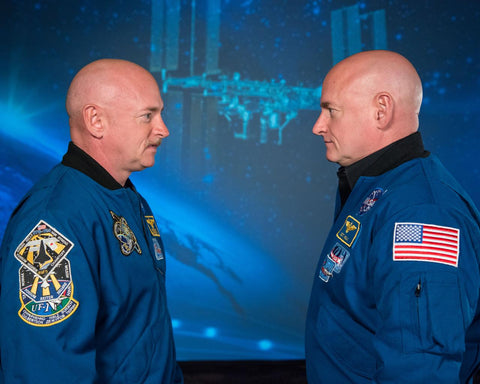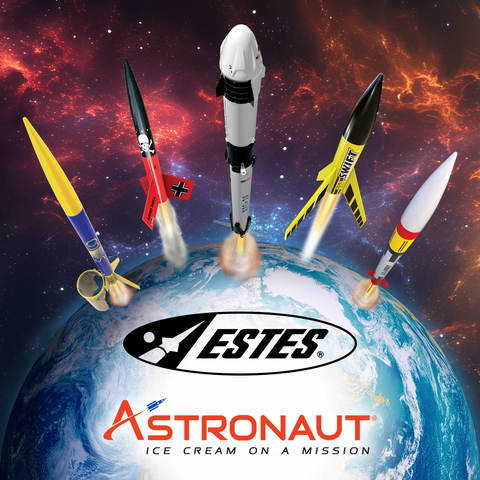The story of Scott and Mark Kelly is not just a tale of two astronauts but a groundbreaking chapter in space science. As identical twins, they provided NASA with a unique opportunity to understand the effects of long-term spaceflight on the human body. Here's a look at the fascinating insights from the NASA Twins Study and its relevance to future space missions and astronaut nutrition.
And thank you NASA for providing images.
The Kelly Twins: A Unique Opportunity
Scott and Mark Kelly are no ordinary siblings. Both have had distinguished careers as astronauts, but their biggest contribution came when Scott spent nearly a year aboard the International Space Station (ISS) from 2015 to 2016, (you can read his book about it here) while Mark remained on Earth. This set the stage for a comparative study that could offer unprecedented insights into the impact of prolonged space travel.

Key Findings from the Twins Study
The NASA Twins Study aimed to explore how long-term spaceflight affects the human body by comparing Scott's in-space experiences with Mark's Earth-bound baseline. Some of the most intriguing findings included changes in gene expression, DNA methylation, and telomere length (the protective caps at the ends of chromosomes). While Scott's telomeres initially lengthened in space, they shortened rapidly upon his return to Earth, highlighting the dynamic nature of the human genome under different environmental stresses.
Here is a summery from NASA about the twin study>
Physical and Mental Health Changes
Scott experienced several physical changes during his year in space, including alterations in bone density and muscle mass due to microgravity. Vision changes, a common issue for astronauts, were also observed. Additionally, cognitive tests indicated some temporary decline in speed and accuracy, which normalized after his return. These insights are crucial for preparing future astronauts for extended missions, such as trips to Mars.
The Space Microbiome
Another fascinating aspect of the study was the change in Scott's gut microbiome. The diversity of gut bacteria altered during his time in space, which could have implications for nutrition and health in long-duration spaceflights. This finding underscores the importance of maintaining a balanced diet, a challenge that companies like Astronaut Foods are looking to address with specially designed space nutrition, beyond ice cream.
Psychological Effects of Isolation
Spending a year in the isolated, confined environment of the ISS posed significant psychological challenges. Scott's experience highlighted the importance of mental health support and coping strategies for astronauts. He engaged in regular communication with his family, personal hobbies, and a structured schedule to manage the stress of isolation.
Implications for Future Missions
The Twins Study has far-reaching implications for future space missions. Understanding the biological, physical, and psychological effects of long-term spaceflight helps NASA develop better countermeasures to protect astronauts' health on missions to Mars and beyond. These findings also contribute to improvements in Earth-based medical research, potentially benefiting those with similar health challenges.

Space Nutrition: Freeze-Dried Food
Nutrition is a critical aspect of astronaut health. During the study, Scott's food intake was meticulously monitored and adjusted to meet the demands of space travel.
Providing nutrient-rich meals, such as freeze-dried meals, that are both practical and palatable for space missions. The importance of balanced nutrition, as highlighted by the Twins Study, reinforces the value of high-quality space food.
In fact our sister company, Backpacker's Pantry, making of freeze-dried camping meals since 1951, provided meals to Space Shuttle astronauts. As the ISS came online, nutrition and ingredients needed to change to keep crews healthy and productive.
Check out our History of Space Food Guide >
Personal Reflections from the Kelly Brothers
Both Scott and Mark have shared personal reflections on their unique experiences. Scott's year in space not only tested his physical limits but also deepened his appreciation for the Earth and the fragility of our planet. Mark, on the other hand, provided invaluable support and a comparative baseline that made the study possible.

Fun Facts
Did you know that Scott Kelly grew two inches taller during his time in space? This temporary change was due to the lack of gravity allowing his spine to stretch. Such fun facts add a human touch to the scientific data and remind us of the incredible adaptability of the human body.
Conclusion
The NASA Twins Study is a milestone in space research, offering crucial insights that will shape the future of space exploration. By understanding the effects of long-term spaceflight on the human body, we can better prepare for missions to distant planets. The study also highlights the importance of proper nutrition and mental health support.
As we look to the stars, the lessons learned from Scott and Mark Kelly will guide us on our journey through space.






